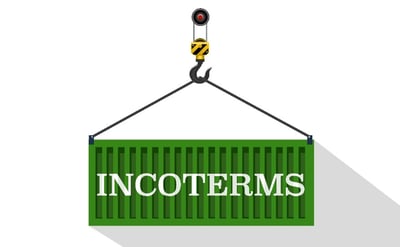Use Incoterms? Avoid these common problems
A common issue seen by our freight team is importers not knowing their terms of sale, and therefore not using the correct Incoterm. Knowing where your responsibility lies, along with proper training on Incoterms, will help make your goods move that much more smoothly, something especially helpful when space issues are at a premium.
Are you making these common Incoterms-related mistakes?
Whether you are an importer or an exporter, every time you move goods, numerous details surround each transaction. It’s all too easy for some of these details to slip through the cracks. For many companies, Incoterms is one such area of detail that is especially slippery.
 Incoterms (or International Commercial Terms) are specific terms used in international commercial transactions. Simply put, they are three-letter acronyms used to clearly communicate the risks, costs, and tasks associated with international transportation and the delivery of goods.
Incoterms (or International Commercial Terms) are specific terms used in international commercial transactions. Simply put, they are three-letter acronyms used to clearly communicate the risks, costs, and tasks associated with international transportation and the delivery of goods.
There are many common problems our customers have with Incoterms. For example, sometimes the shipping and receiving personnel don’t know the terms of a sale or a purchase, especially if those terms were generated in a centralized head office location. In a case like this, gaps in communication around the responsibility of both buyer and receiver, as well as other gaps in communication (e.g understanding the buyer’s intent) could inadvertently lead to using the incorrect Incoterm.
Another common area for mistakes is in understanding the nature of Incoterms themselves. Although Incoterms are rules for companies to use and be guided by, they are not contracts. This often leads to confusion, particularly if you have any service or parts agreements within which the terms and conditions supersede an Incoterm.
The overarching challenge for most companies struggling to get Incoterms right is simply not knowing where to go to get information on Incoterms. Some of the explanations can seem overly complicated or confusing. Moving your goods and doing anything in the logistics space can feel overwhelming quickly if you are not paying attention, and Incoterms do not necessarily diminish that.
Other examples of mistakes we’ve seen companies make when it comes to Incoterms include using deliver duty paid (DDP) as a “catch-all” for risk. Although DDP places risk on the sellers, buyers lose control over the timing of their goods arriving and often delays occur, as many countries do not support overseas companies acting as importers. Sellers also often make additional profit through marking up their logistics costs.
Another commonly misused Incoterm is free on board (FOB). Because the term FOB in Incoterms differs from FOB in Uniform Commercial Code (UCC), this Incoterm is used improperly on a daily basis! In Incoterms, FOB should be used for goods transiting via ocean/waterway, but under the American UCC, FOB can be used for any mode of transport. We often see buyers or sellers using this Incoterm improperly, in expression, version and place of the agreement. Understanding that proper expression of the Incoterm can lead to clearer expectations for both parties, wrong expression of Incoterms like this can result in relationship issues between buyers and sellers.
Why it's important to get Incoterms right
Taking the time to learn Incoterms comprehensively will help your company in the big picture. Delays of any kind can cost all parties, especially when timelines and deadlines are not met. Depending on the industry your company is in, using the wrong Incoterm could mean missing a sales cycle, or affecting your manufacturing deadlines negatively.
Here’s one example of what might happen if you don’t get your Incoterms right. We once explained to a customer that importing their goods on a FOB basis would allow us to have complete traceability/ visibility of their cargo at all times. Despite being told this, the customer imported their cargo on a cost, insurance, freight (CIF) basis.
 Setting the terms as CIF meant that the seller organized the booking of the cargo from China to Canada, booking with an origin co-loader but with no booking details given to the buyer. The buyer thus had no idea where the cargo was during transit. They also had no idea when the cargo would arrive.
Setting the terms as CIF meant that the seller organized the booking of the cargo from China to Canada, booking with an origin co-loader but with no booking details given to the buyer. The buyer thus had no idea where the cargo was during transit. They also had no idea when the cargo would arrive.
Some weeks later, the customer was advised their goods had arrived. But they only found out after the local warehouse let them know they’d received the goods and required Canadian customs clearance prior to delivery!
In this case, using the incorrect Incoterm left the buyer completely in the dark in terms of knowing where the shipment was and when it might arrive. This then impacted their ability to move the product, or even give accurate timelines for any further delivery required to the buyer’s own customers. Worse, this also left the buyer at risk of not being compliant with customs, as they had no working timeline to prepare customs paperwork within that might allow them to be proactive.
It may seem like just another detail in the moment, but as the story reveals, if you don’t get that one detail right, and in the moment it most matters, you potentially derail the entire process.
As we’ve explained above and through the scenario, strengthening your knowledge of Incoterms clearly helps you avoid the following:
- Costly delays
- Damages
- Insurance issues
- Weakening the relationship between buyer/ seller due to roles not being clearly defined
When it comes to Incoterms, Cole has you covered
Logistics is complex at the best of times, full of moving pieces and details. This is why partnering with a knowledgeable freight forwarder is ultimately the best practice of all. Not only is our team steeped in information, we love to share it. We can help you obtain the learning tools you need—including customized Incoterms training for your business units.
Beyond this, here are a few other best practices to get you on the right path when it comes to Incoterms:
- Understand what risk and responsibility you are willing and able to take on when considering an Incoterm
- Receive in-depth education and Incoterms training that is customized to your business
- Grow your knowledge independently by reviewing the information we have on the topic:
About Cole International’s Freight Forwarder Services
At Cole, we’re proud to have been your freight forwarder for more than 60 years. A freight forwarder is at the frontlines of the global supply chain challenges the world faces today. These blog updates provide you with the latest freight news: keeping you connected with the complex issues a freight forwarder is navigating at this time. Reach out to us today to learn how we can streamline your shipping operations.

